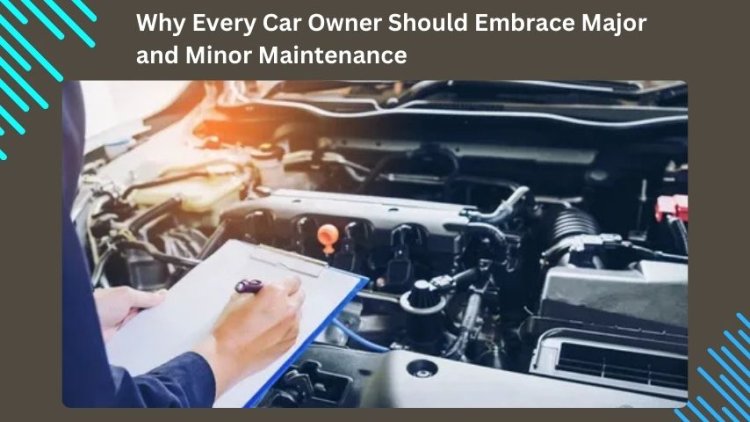Why Every Car Owner Should Embrace Major and Minor Maintenance
Ensure your car's optimal performance with our comprehensive major and minor maintenance services. From oil changes to engine overhauls, we deliver reliable auto care tailored to your needs.

Owning a car is a responsibility that goes beyond just driving it. Regular maintenance is the backbone of a vehicle’s performance and longevity. By keeping up with both major and minor car maintenance, you can ensure your car stays in top condition for years. Let’s dive into why every car owner should embrace these essential practices.
What is Major and Minor Car Maintenance?
To understand the importance, it’s essential to know what major and minor car maintenance entails. Each type of maintenance serves a specific purpose and addresses different aspects of a car’s health.
Additionally: Start prioritizing your vehicle’s care today. Major and minor car maintenance may seem like a chore, but it’s a smart investment in your car’s safety, efficiency, and value. Take the first step and set up your maintenance schedule to enjoy a smoother, worry-free driving experience!
Minor Car Maintenance
Minor maintenance involves regular and routine tasks that keep your vehicle running smoothly. These are quick and simple services that prevent wear and tear from turning into larger issues. Common examples include:
- Checking and refilling engine oil, coolant, and other fluids.
- Inspecting and maintaining proper tire pressure.
- Replacing windshield wiper blades for better visibility.
- Cleaning or replacing the air filter to improve engine performance.
- Inspecting lights to ensure they’re functioning properly.
These tasks might seem small, but they play a vital role in keeping your car safe and efficient on the road.
Major Car Maintenance
Major maintenance involves more detailed inspections and replacements that typically occur less frequently. These tasks are crucial for the long-term health of your vehicle. Examples include:
- Replacing the timing belt or chain, which prevents engine damage.
- Servicing or replacing the transmission fluid for smoother gear changes.
- Inspecting and replacing spark plugs to maintain engine performance.
- Checking and replacing brake pads and rotors for safe braking.
- Inspecting suspension components to ensure a comfortable ride.
While these tasks require more time and expertise, they prevent costly repairs and breakdowns in the future.
Why Major and Minor Car Maintenance Matters
Now that we know what these tasks involve, let’s discuss why they are so important. Ignoring regular maintenance can lead to serious issues, while staying proactive ensures your car performs at its best.
Prevents Breakdowns
One of the biggest benefits of regular maintenance is avoiding unexpected breakdowns. Minor checks can catch small problems, like a low oil level or worn-out tires, before they escalate. Major services ensure that critical systems like brakes and the engine stay in top shape. A well-maintained car is less likely to leave you stranded on the side of the road.
Saves Money
While it might feel like maintenance costs add up, they’re far cheaper than unexpected repairs. For example, replacing a timing belt on time is less expensive than repairing a damaged engine caused by a snapped belt. Addressing minor wear and tear prevents bigger, costlier issues in the future.
Improves Safety
Safety should always be a priority for any driver. Regular maintenance ensures your car’s brakes, tires, and lights are in optimal condition. Whether it’s stopping on a wet road or driving at night, properly maintained components keep you and your passengers safe.
Enhances Fuel Efficiency
A poorly maintained car uses more fuel. For instance, underinflated tires create more resistance, making your engine work harder. Dirty air filters reduce the efficiency of combustion. By addressing these issues, you can save on fuel costs while reducing your car’s environmental impact.
Increases Car Lifespan
Cars are expensive, and you want yours to last as long as possible. Regular maintenance keeps all parts functioning as they should, reducing unnecessary wear and tear. This means your car will stay reliable for years, saving you the cost of premature replacement.
Maintains Resale Value
If you ever decide to sell your car, a good maintenance history adds significant value. Buyers are more likely to trust a vehicle that has been well cared for. Keeping records of your major and minor car maintenance can make the selling process easier and more profitable.
How to Stay on Top of Major and Minor Car Maintenance
Consistency is key when it comes to car maintenance. Here’s how you can create a system to ensure you don’t miss any important tasks.
Understand Your Car’s Needs
Every car is different. Your owner’s manual is the best place to start. It contains specific recommendations for service intervals, fluid types, and replacement schedules. Understanding your car’s unique requirements helps you prioritize the right tasks at the right time.
Create a Maintenance Calendar
Organize maintenance tasks based on their frequency. For example:
- Weekly Tasks: Check tire pressure, inspect lights, and top up washer fluid.
- Monthly Tasks: Inspect engine oil, check belts and hoses, and test the battery.
- Quarterly or Every 3 Months: Replace oil and oil filter, inspect brakes, and check air filters.
- Yearly or Every 12,000 Miles: Rotate tires, perform a thorough brake inspection, and replace cabin air filters.
- Long-Term Tasks: Replace spark plugs, inspect the suspension, and service the transmission every 30,000 to 60,000 miles.
Set Reminders
Use a smartphone app, calendar, or notebook to set reminders for upcoming tasks. Staying organized ensures you don’t miss any essential services.
Perform Visual Inspections
Even if you’re not a car expert, a simple visual inspection can alert you to potential problems. Look for things like uneven tire wear, low fluid levels, or unusual noises. If something seems off, consult a professional.
Know When to Visit a Mechanic
While minor maintenance tasks can often be done at home, major services usually require professional expertise. Find a trusted mechanic who can handle complex repairs and inspections. Building a good relationship with your service provider ensures your car gets the attention it needs.
Budget for Maintenance Costs
Maintenance costs can vary depending on your car’s age, make, and model. Setting aside a small amount each month helps you prepare for routine services and unexpected repairs. Preventive maintenance is always more affordable than fixing major issues.
Address Seasonal Needs
Different seasons require specific maintenance tasks. For example:
- Winter: Check your battery, switch to winter tires, and ensure antifreeze levels are adequate.
- Summer: Inspect the cooling system, test the air conditioning, and check tire pressure.
Preparing your car for seasonal changes ensures smooth performance all year round.
Common Myths About Car Maintenance
There are several misconceptions about car maintenance that can lead to poor decisions. Let’s clear up a few:
-
Myth: “If it isn’t broken, don’t fix it.”
Reality: Regular maintenance prevents problems from occurring in the first place.
-
Myth: “All maintenance tasks are expensive.”
Reality: Minor tasks like checking fluids and tire pressure are affordable and save money in the long run.
-
Myth: “You only need maintenance before a long trip.”
Reality: Maintenance should be consistent, not just when planning a road trip.
Conclusion
Embracing major and minor car maintenance is not just about keeping your car running; it’s about ensuring safety, saving money, and extending the life of your vehicle. Regular attention to small tasks prevents bigger problems and keeps your car performing at its best.
For more insightful articles related to this topic, feel free to visit bipny.
What's Your Reaction?




















